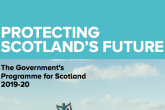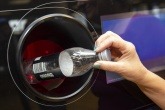Legislation indicates 2021 start date for Scottish DRS
The Scottish Government has submitted draft legislation for the introduction of its deposit return scheme (DRS) for beverage containers, with the scheme currently slated for a 1 April 2021 commencement date.
The DRS, which has been in the pipeline for some time with First Minister Nicola Sturgeon committing to the idea in 2017, will be an ‘all in’ model where drinks containers of between 50 millilitres and three litres in size made from aluminium, steel, glass and PET plastic will carry a deposit of 20 pence, which can be recouped when returned to a designated return point for recycling.
The legislation, which was submitted yesterday (10 September), states that Scottish consumers will be able to return their containers over the counter or by using a reverse vending machine (RVM). RVMs take products, read bar codes, return the deposit to the user and store containers ready for collection. The deposit will be able to be recouped in the form of cash at the till, a token or voucher or digitally.

Producers will be required to collect a target percentage of containers covered by the DRS that they place onto the market every year by collecting their own containers from retailers and accepting the return of containers from wholesalers, reimbursing deposits for these collected items.
These targets will increase over the first three years of the scheme’s operation, from 70 per cent in year one, to 80 per cent in year two, to 90 per cent in year three. Producers may also sign up to a scheme administrator to fulfill their obligations on their behalf.
The Scottish Environment Protection Agency(SEPA) will act as the enforcement authority for the DRS, with a separate instrument to be brought forward to include specified offences in relation to a DRS in the Environmental Regulation (Enforcement Measures) (Scotland) Order 2015, which would allow SEPA to hand out civil enforcement measures for non-compliance.
The draft legislation includes a consultation period for the Scottish Parliament and the general public open until 10 December 2019. Comments will be considered before bringing the final regulations forward to a vote in the Scottish Parliament.
‘Ambitious in scale and scope’
The DRS is seen as a key part of the Scottish Government’s circular economy plans, which feature prominently in its Programme for Government 2019/20, with the government set to table a Circular Economy Bill in the coming months.
The Scottish Government hopes that the introduction of a DRS will see a dramatic reduction in the littering of single-use drinks containers and provide a boost to the nation’s recycling rates – research from Zero Waste Scotland suggests that a DRS will result in almost 11 million fewer plastic bottles littered every year in Scotland.
And the scheme has widespread support from the Scottish public. The Scottish Government and Zero Waste Scotland have held a number of consultations and workshops with the public to gauge support, with a recent survey showing four in five Scots back a DRS.
Environment Secretary Roseanna Cunningham said: “Our DRS is the first national scheme of its type in the UK. It is ambitious in scale and scope, and gives the people of Scotland a clear and straightforward way to do their bit for the environment.
“Research has shown that the scheme is anticipated to reduce the £46 million spent each year on litter removal and is expected to reduce emissions equivalent to taking 85,000 cars off our roads, while also enjoying widespread public support across Scotland.
“There is a global climate emergency which demands we show ambition to tackle it and safeguard our planet for future generations. This process will enable us to fine tune our proposals to ensure that they work well for industry, retail and the public, and we will continue to work with the Implementation Advisory Group to that end. I am delighted to confirm that the regulations required to bring our Deposit Return Scheme into reality have now been laid.”
Iain Gulland, Chief Executive of Zero Waste Scotland, added: “These regulations put Scotland on track to deliver a world class deposit return scheme. Placing a 20p deposit on drinks bottles and cans shows that these materials have a value to our economy, and a cost to our climate if they are wasted.
“That 20p incentive will boost recycling and cut Scotland’s CO2e emissions, playing a part in the fightback against the climate emergency. It's little wonder that nearly four in five Scots support it. With drinks producers given the opportunity to group together to deliver the scheme, they can lead this exciting step towards a more circular economy.”
Industry consultation ‘disappointingly light’
Despite the resoundingly positive reception from the public, industry has been less than enthusiastic about a DRS.
The Scottish Environmental Services Association (SESA), a trade body representing Scotland’s resource and waste management industry, welcomed the opportunity to review the Scottish Government’s draft regulations for a DRS. SESA Policy Advisor Stephen Freeland said: “Consultation with the waste management industry on DRS has been disappointingly light, with producers and retailers the sole focus of Zero Waste Scotland’s engagement on scheme design. We hope that publication of the draft regulations heralds a more inclusive approach to engaging the wider supply chain, including our sector which stands ready to invest in the services and infrastructure needed to make a success of the scheme.
“Aspects of the scheme would benefit from more detailed parliamentary scrutiny, such as the decision to include glass bottles. It is perhaps noteworthy that Norway, the inspiration for Scotland’s DRS, does not include glass. It is also a source of frustration that the Scottish Government continues to push ahead with DRS in isolation, with greater environmental gains likely to be achieved at lower cost if beverage containers were considered more fully in the context of anticipated reforms to extended producer responsibility.
“To build a DRS from scratch for April 2021 remains incredibly ambitious, and this creates significant uncertainty on what infrastructure is needed where, while also impacting on investment decisions for kerbside collections. Discussion with SESA Members on this needs to start now if everything is to be in place on time.”
The inclusion of glass has provoked particular consternation within industry. Last month (28 August), glass industry trade body British Glass wrote an open letter to Cunningham raising concerns over the inclusion of glass in the DRS, stating that its inclusion would be counterproductive to the achievement of Scotland’s environmental ambitions and would negatively impact on glass recycling.
Commenting on yesterday’s announcement, British Glass CEO Dave Dalton said: “We are disappointed that the Scottish Government, regardless of concerns from industry, continues to push forward with a DRS including glass.
“We believe that the Scottish Government is bringing in the DRS to tackle a plastic litter issue rather than taking a measured and joined-up approach to improving the wider recycling infrastructure. The glass sector will unfairly pay the price for the fight against plastic litter when we believe there is not a glass litter problem.
“Recycling is such an important issue for our sector, both in terms of the circular economy and decarbonisation, so it is vital that we get it right. We do not believe that including glass in the DRS will achieve the environmental goals set out by the Scottish Government. In fact, waste management experts argue that including glass in a DRS would actually reduce the current UK glass recycling rate of 67 per cent.
“The glass sector is fully committed to increasing the amount of glass we recycle and we do not believe that a DRS which includes glass will achieve this. We support an EPR alternative solution where producers pay, not members of the public”











